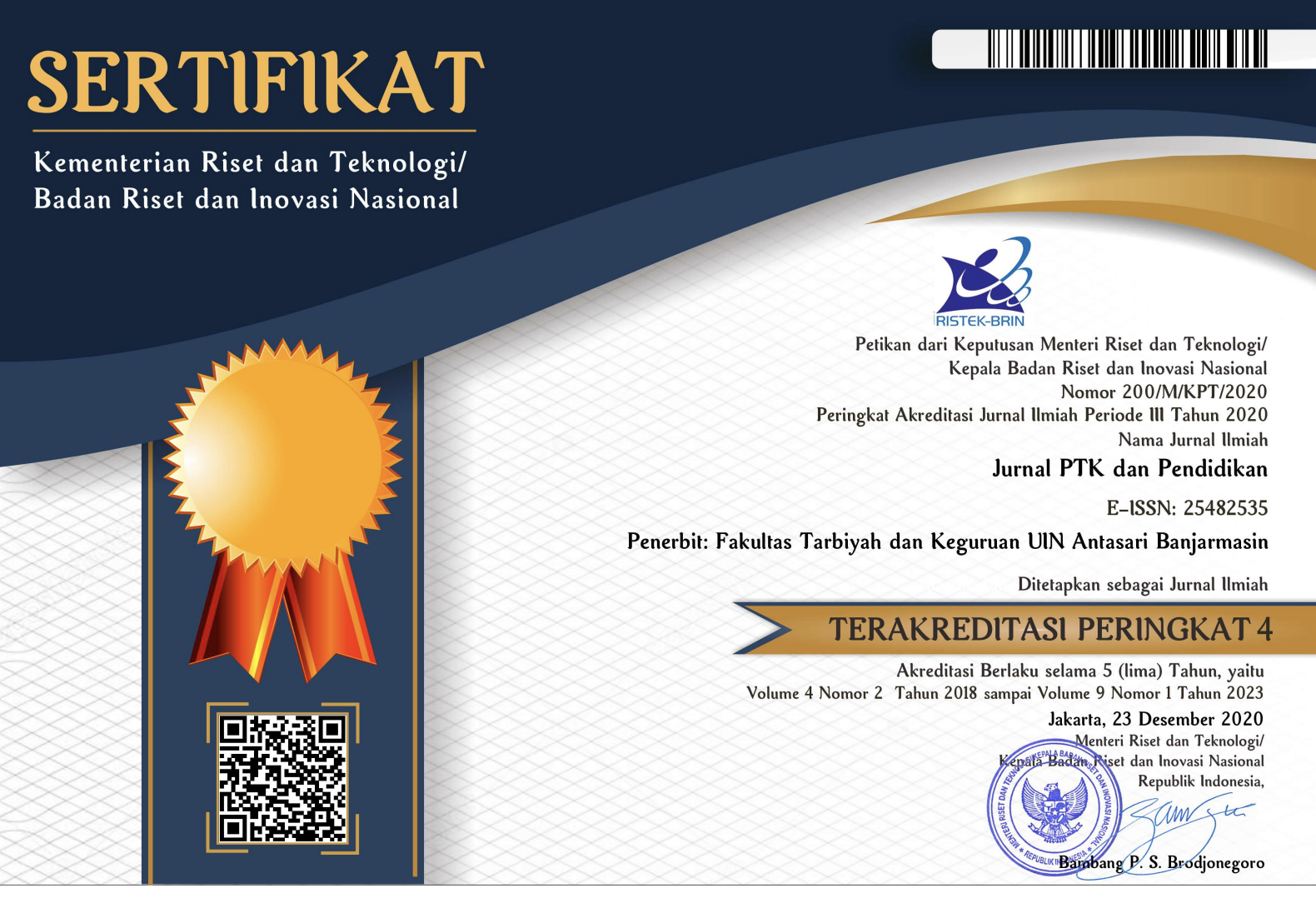DIRECT EVALUATION OF OBE CURRICULUM IMPLEMENTATION IN UNDERGRADUATE PROGRAM STUDY OF NUTRITION UNIVERSITAS NEGERI SURABAYA
DOI:
https://doi.org/10.18592/ptk.v10i2.14283Keywords:
curriculum, program study of nutrition, OBE, PLO, Universitas Negeri SurabayaAbstract
Program Learning Outcomes (PLO) assessment is an important part of Outcome Based Education curriculum. This present study aims to directly measure the PLOs’ achievement in the bachelor program of Nutrition, Universitas Negeri Surabaya. The PLOs of the program study consist of three domain aspects namely knowledge, skill, and attitude. The direct measurement was derived from students’ performances in a total of 16 courses taught in even semesters (semesters 2, 4, 6, and, 8) of the program study. The students’ performances were assessed based on their performances in quizzes, classroom participation, mid-semester test, and final semester test by using a rubric of measurement. From the total of 9 PLOs, only 7 PLOs are assessed because in the even semesters, there was no course containing PLO 4 and 9 for their objective. Overall, the PLO mean score was ranging from 73.8 to 82.2. The domain of knowledge has the lowest score compared to the domain of skill and the domain of attitude although the gap difference is very small.References
Alam, I., Jan, A., Noushad, S. & Haq, Z.-. (2017). Nutrition & Dietetics Curriculum for Bs Study Program-Assessment and Evaluation. International Journal of Endorsing Health Science Research (Ijehsr), 5(3), 04. https://doi.org/10.29052/ijehsr.v5.i3.2017.04-16
Bailey, R. L., Kiesel, V. A., Lobene, A. J. & Zou, P. (2020). Redesigning an Undergraduate Nutrition Course through Active Learning and Team-Based Projects Enhances Student Performance. Current Developments in Nutrition, 4(4), 1–5. https://doi.org/10.1093/CDN/NZAA039
Bavishi, P., Birnhak, A., Gaughan, J., Mitchell-Williams, J. & Phadtare, S. (2022). Active Learning: A Shift from Passive Learning to Student Engagement Improves Understanding and Contextualization of Nutrition and Community Health. Education Sciences, 12(7). https://doi.org/10.3390/educsci12070430
Istadi, Y., Raharjo, T. J., Azam, M. & Mulyono, S. E. (2022). Academic Performance in Medical Education During the COVID-19 Pandemic: A Scoping Review. Advances in Medical Education and Practice, 13(November), 1423–1438. https://doi.org/10.2147/AMEP.S383274
Khanna, R. & Mehrotra, D. (2019). The roadmap for quality improvement from traditional through competency based (CBE) towards outcome based education (OBE) in dentistry. Journal of Oral Biology and Craniofacial Research, 9(2), 139–142. https://doi.org/10.1016/j.jobcr.2019.02.004
Nkhoma, M. Z., Lam, T. K., Sriratanaviriyakul, N., Richardson, J., Kam, B. & Lau, K. H. (2017). Unpacking the revised Bloom’s taxonomy: developing case-based learning activities. Education and Training, 59(3), 250–264. https://doi.org/10.1108/ET-03-2016-0061
Patel, V. L., Yoskowitz, N. A. & Arocha, J. F. (2009). Towards effective evaluation and reform in medical education: A cognitive and learning sciences perspective. Advances in Health Sciences Education, 14(5), 791–812. https://doi.org/10.1007/s10459-007-9091-1
Putra, P., Liriwati, F. Y., Tahrim, T., Syafrudin, S. & Aslan, A. (2020). The Students Learning from Home Experiences during Covid-19 School Closures Policy In Indonesia. Jurnal Iqra’ : Kajian Ilmu Pendidikan, 5(2), 30–42. https://doi.org/10.25217/ji.v5i2.1019
Richland, L. E. & Simms, N. (2015). Analogy, higher order thinking, and education. Wiley Interdisciplinary Reviews: Cognitive Science, 6(2), 177–192. https://doi.org/10.1002/wcs.1336
Sagala, P. N. & Andriani, A. (2019). Development of Higher-Order Thinking Skills (HOTS) Questions of Probability Theory Subject Based on Bloom’s Taxonomy. Journal of Physics: Conference Series, 1188(1), 0–13. https://doi.org/10.1088/1742-6596/1188/1/012025
Sikander, T., Aziz, H., Wasim, A., Hussain, S. & Jahanzaib, M. (2017). Continuous quality improvement (CQI) framework: A case of industrial engineering department. International Journal of Cognitive Research in Science, Engineering and Education, 5(1), 107–120. https://doi.org/10.5937/IJCRSEE1701107S
Thirumoorthy, G. (2021). Outcome Based Education (OBE) is Need of the Hour. Educational Quest- International Journal of Education and Applied Social Sciences, 12(1). https://doi.org/10.30954/2230-7311.1.2021.6
University of California. (2013). Guidelines for the Development and Assessment of Program Learning Outcomes (Issue September).
Bush, W. S., & Greer, A.S. (Eds). (1999). Mathematics assessment. A practical handbook for grade 9–12. Reston, VA: The National Council of Teachers of Mathematics Inc.
Carlson, M. P., & Bloom, I. (2005). The cyclic nature of problem solving: an emergent multidimensional problem solving framework. Educational Studies in Mathematics, 58, 45–75. doi:10.1007/s10649-005-0808-x.
Charles, R., Lester. F., & O’Daffer, P. (1997). How to evaluate progress in problem solving. Reston, VA: The National Council of Teachers of Mathematics, Inc.
Hannula, M. S. (2002). Attitude toward mathematics: Emotions, expectations and values. Educational Studies in Mathematics, 49, 25–46. doi:10.1023/A:1016048823497.
Ho, K. F., & Hedberg, J. G. (2005). Teachers’ pedagogies and their impact on students’ mathematical problem solving. Journal of Mathematical Behaviour, 24, 238–252. doi:10.1016/ j.jmathb.2005.09.006.
Mairing, J. P. (2014). Student’s difficulties in solving problem of real analysis. In H. Sutrisno, W. S. Dwandaru, & K. P. Krisnawan (Ed.), International Conference on Research, Implementation and Education of Mathematics and Sciences (ICRIEMS) (pp. ME 321 – 330). Yogyakarta, Indonesia: Universitas Negeri Yogyakarta.
Rossi-Le, L. (1989). Perceptual learning style preferences and their relationship to language learning strategies in adult students of English as a Second Language. (Unpublished dissertation). Drake University, USA.
Ruffel, M., Mason, J. and Allen, B. (1998). Studying attitude to mathematics. Educational Studies in Mathematics, 35, 1–18. doi:10.1023/A:1003019020131.
Downloads
Published
How to Cite
Issue
Section
License
Copyright (c) 2025 Veni Indrawati, Lini Sholihah, Cleonara Yanuar Dini

This work is licensed under a Creative Commons Attribution 4.0 International License.
- The right to publication of all journal material published on the Jurnal PTK dan Pendidikan website is held by the editorial board with the author's knowledge (moral rights remain the property of the author).
- The formal legal provisions for access to digital articles of this electronic journal are subject to the terms of the Creative Commons CC BY 4.0 DEED Attribution International (CC BY) license. This license enables reusers to distribute, remix, adapt, and build upon the material in any medium or format, so long as attribution is given to the creator. The license allows for commercial use.
- Printed and electronic published manuscripts are open access for educational, research and library purposes. In addition to these objectives, the editorial board shall not be liable for violations of copyright law.






